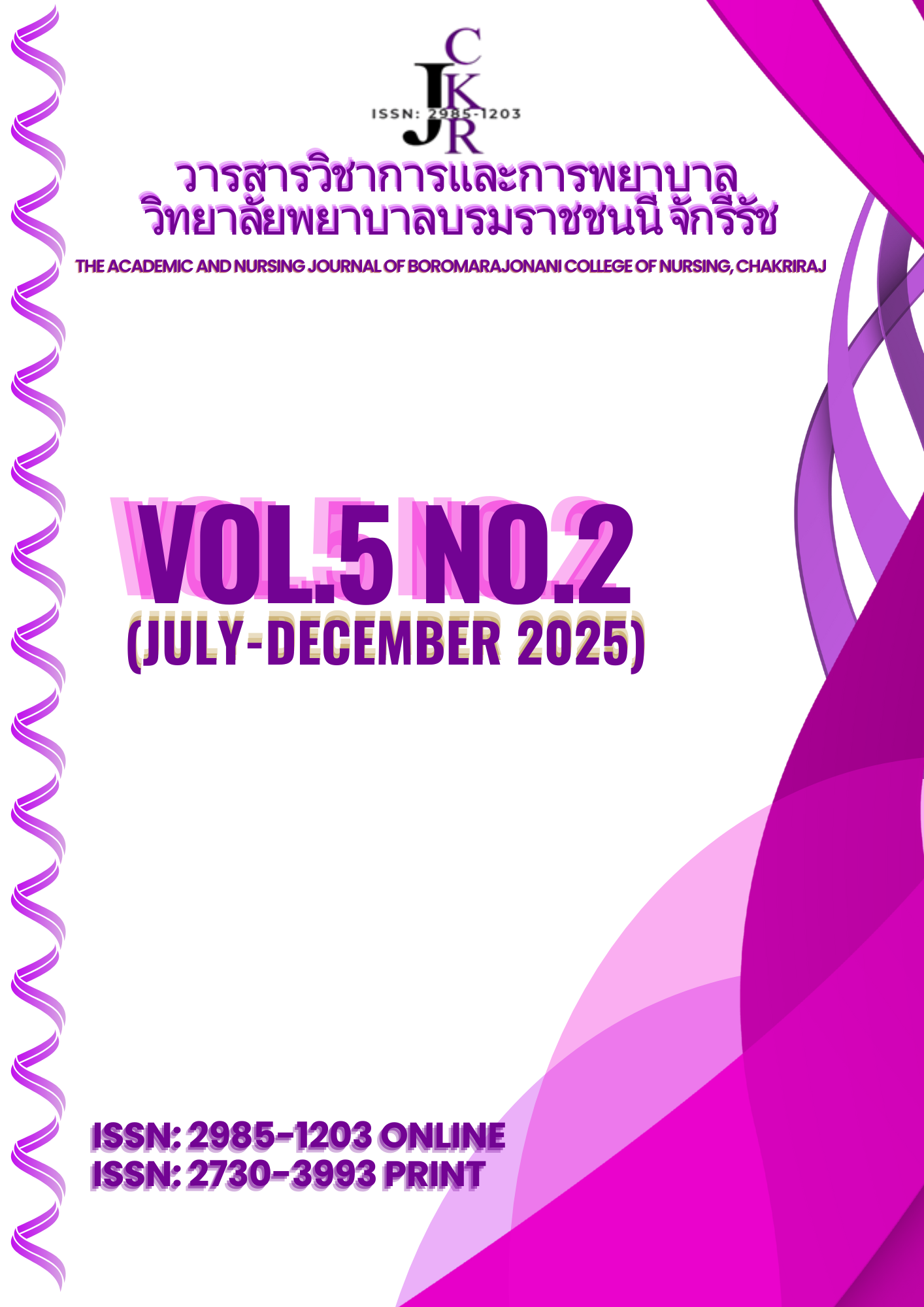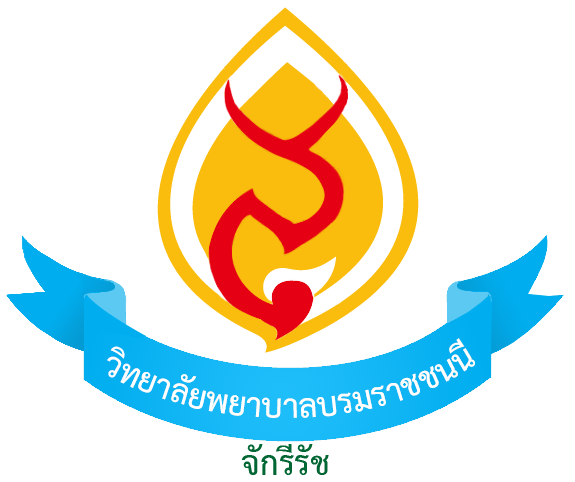Development of the Heal Jai Application in Promoting Mental Health among Higher Education Students
Keywords:
mental health promotion, mental health literacy, Heal Jai application, higher education studentsAbstract
This action research aimed to develop and evaluate the “Heal Jai” application to promote mental health among higher education students. The study was conducted in three phases. Phase 1 analyzed problems and needs through focus group discussions with 12 students and in-depth interviews with 5 advisors, with data analyzed using content analysis. Phase 2 focused on developing and assessing the quality of the application among 10 university students. Phase 3 evaluated the application’s effectiveness with a sample of 88 undergraduate students. Research instruments included the Mental Health Literacy Scale, Resilience Questionnaire, and Rosenberg Self-Esteem Scale. All instruments were validated by three experts, with an Index of Item-Objective Congruence of .67–1.00 and Cronbach’s alpha coefficients of .72, .77, and .75, respectively. Data was analyzed using descriptive statistics and t-tests.
Results revealed that students faced mental health problems and lacked adequate information and understanding, highlighting the need for accessible support services. The Heal Jai application was developed with key features including mental health assessment, health promotion activities, counseling appointments, and service access channels. The application’s overall quality was rated at a good level (x̅ = 4.46, SD = 0.28). Effectiveness testing showed that users had significantly higher mean scores of mental health literacy and resilience quotient compared to the control group (t = 3.43, p = .028; t = 2.21, p = .034). After using the application, participants’ scores in these two areas also increased significantly (t = 3.47, p = .024; t = 6.82, p < .001). However, no significant difference was found in self-esteem between groups (p = .228).
Downloads
References
Dessauvagie AS, Dang HM, Nguyen TAT, Groen G. Mental health of university students in Southeastern Asia: a systematic review. Asia-Pacific J Public Health 2022;34:172-81. doi: 10.1177/10105395211055545. PubMed PMID: 34798781.
วรวรรณ จุฑา, กมลลักษณ์ มากคล้าย, ดวงดาว ศรีเรืองรัตน์, เรวดี จายานะ, ความชุกและแนวโน้มปัญหาสุขภาพจิตของคนไทยช่วงโควิด-19 พ.ศ. 2563–2565. วารสารสุขภาพจิตแห่งประเทศไทย 2566;31(3):227-39.
Wongpakaran N, Oon-Arom A, Karawekpanyawong N, Lohanan T, Leesawat T, Wongpakaran T. Borderline personality symptoms: what not to be overlooked when approaching suicidal ideation among university students. Healthcare (Basel) 2021;9:1399. doi: 10.3390/healthcare9101399. PubMed PMID: 34683078.
Liangruenrom N, Joshanloo M, Hutaphat W, Kittisuksathit S. Prevalence and correlates of depression among Thai university students: nationwide study. The British Journal of Psychiatry Open 2025;11:e59(1–8). doi: 10.1192/bjo.2025.21. PubMed PMID: 40103570.
ปรินดา ตาสี. ความรอบรู้ทางสุขภาพจิตและแนวทางการสนับสนุนด้านสุขภาพจิตของนักศึกษามหาวิทยาลัยธรรมศาสตร์ ศูนย์ลำปาง. วารสารสังคมสงเคราะห์ศาสตร์ 2565;30(1):91-126.
รณภูมิ สามัคคีคารมย์, ชนัยชนม์ นาราษฎร์, นนท์ธิยา หอมขำ, กัญญาณี ปิ่นเมือง, อินทุมาศ คลายโศก, เจษฎาภรณ์ เพียโคตร, และคนอื่น ๆ. การเข้ารับบริการสุขภาพจิต ปัญหาอุปสรรคต่อการรับรู้ และเข้ารับบริการศูนย์บริการสุขภาพจิต มหาวิทยาลัยของรัฐแห่งหนึ่งในภาคกลาง. วารสารวิจัยสังคมและปริทัศน์ 2566;46(1):74-100.
สำนักงานวิชาการสุขภาพจิต กรมสุขภาพจิต. เปลี่ยนร้ายกลายเป็นดี พลังสุขภาพจิต RQ: Resilience Quotient. พิมพ์ครั้งที่ 3. นนทบุรี: บริษัท บียอนด์พับลิสชิ่ง จำกัด; 2563.
ศรีประไพ อินทร์ชัยเทพ, สิริอร พัวศิริ, มณีรัตน์ พันธุ์สวัสดิ์, ประภาศรี ทุ่งมีผล, วินัย รอบคอบ. การพัฒนาตัวบ่งชี้การรู้เท่าทันสุขภาพจิตสำหรับประชาชนทั่วไป. วารสารวิทยาลัยพยาบาลบรมราชชนนี อุตรดิตถ์ 2561;10(2):97-109.
Jorm AF. Mental health literacy: Public knowledge and beliefs about mental disorders. The British Journal of Psychiatry 2000;177:396-401. doi: 10.1192/bjp.177.5.396. PubMed PMID: 11059991.
ณัฏฐภัณฑ์สัณฑ์ ศรีวิชัย, มัจฉรีย์ คู่วิวัฒน์ชัย. นักเรียนนักศึกษาและความรอบรู้สุขภาพจิต. วารสารสังคมสงเคราะห์ศาสตร์ 2564;29(2):37–50.
Bautista J, Schueller SM. Understanding the adoption and use of digital mental health apps among college students: secondary analysis of a national survey. JMIR Ment Health 2023;10:e43942. doi: 10.2196/43942. PubMed PMID: 36947115.
กองระบบและบริหารข้อมูลเชิงยุทธศาสตร์การอุดมศึกษา วิทยาศาสตร์ วิจัยและนวัตกรรม. กลุ่มพัฒนาและบริหารจัดการข้อมูลเชิงยุทธศาสตร์ (พข.) ข้อมูลสถิติจำนวนนักศึกษารวมทุกชั้นปี [ออนไลน์]. 2562 [เข้าถึงเมื่อ 12 พฤษภาคม 2567]. เข้าถึงได้จาก: https://info.mhesi.go.th/stat_std_all.php
Lincoln YS, Guba EG. Naturalistic Inquiry. Newbury Park, CA: Sage Publications; 1985.
The Joint Committee on Standards for Educational Evaluation. The program evaluation standards, 2nd edition. Thousand Oaks (CA): Sage Publications; 1994.
Brown T. Change by design: how design thinking creates new alternatives for business and society. New York: Harper Business; 2009.
Cohen J. Statistical power for the behavioral sciences. 2nd ed. New York: Academic Press; 1977.
Bloom BS. Handbook on Formative and Summative Evaluation of Student Learning. New York: McGraw–Hill; 1971.
Best JW. Research in Education. Englewood Cliffs, New Jersy: Pretice Hall; 1971.
Coopersmith S. SEI: Self-esteem inventories. Palo Alto (CA): Psychologist Press Inc.; 1984.
Wongpakaran T, Wongpakaran N. A comparison of reliability and construct validity between the original and revised versions of the Rosenberg Self-Esteem Scale. Psychiatry Investing 2012;9:54-8. doi: 10.4306/pi.2012.9.1.54. PubMed PMID: 22396685.
World Health Organization. World health statistics 2022: monitoring health for the SDGs, sustainable development goals. Geneva: World Health Organization; 2022.
Eisenberg D, Lipson SK, Posselt JR. Promoting resilience, mental health, and well-being among college students: Lessons from the Healthy Minds Study. Journal of Behavioral Health Services and Research 2021;48(2):134-46.
วรรณวิภา อ่อนน้อม, สุพัตรา พุ่มทอง, จิราภรณ์ ศิริบูรณ์. ความเครียดและภาวะซึมเศร้าในนักศึกษาพยาบาลและปัจจัยที่เกี่ยวข้อง. วารสารพยาบาลศาสตร์ มหาวิทยาลัยเชียงใหม่2566;45(1):89-102.
Torous J, Nicholas J, Larsen ME, Firth J, Christensen H. Clinical review of user engagement with mental health smartphone apps: Evidence, theory and improvements. Evidence-Based Mental Health 2020;23(1):3-9.
Torous J, Jan Myrick K, Rauseo-Ricupero N, Firth J. Digital mental health and COVID-19:Using technology today to accelerate the curve on access and quality tomorrow. JMIR Ment Health 2020;7:e18848. doi: 10.2196/18848. PubMed PMID: 32213476.
Lim Y, Lee S, Choi S, et al. Health literacy and its impact on health behaviors among university students in South Korea. BioMed Central Public Health 2019;19(1):1234.
Shahidi D, Johnson D. The effect of mental health literacy on psychological help-seeking intention among Thai undergraduate students in Bangkok. Assumption University Journal [online]. 2023 [cited 2025 Aug.1 ]; 10:73-94. Available from: https://assumptionjournal.au.edu/index.php/odijournal/article/view/6553
คณิติน จรโคกกรวด, ลักขณา สริวัฒน์. การพัฒนาแอปพลิเคชันด้านสุขภาพจิตสำหรับการให้การปรึกษารายบุคคลแบบออนไลน์เพื่อลดความเครียดของวัยรุ่น. วารสารชุมชนวิจัยมหาวิทยาลัยราชภัฏนครราชสีมา 2565;16(3):222–35.
Reitz AK. Self‐esteem development and life events: A review and integrative process framework. Social and Personality Psychology Compass 2022;16:e12709. doi:10.1111/spc3.12709.
Manochaiwuthikul T, Chaichutchouwakul A, Yunan N, Winothai N. Health literacy disparities in Thai university students: exploring differences between health science and non-health science disciplines. Journal of Behavioral Health Services and Research 2025;25:557. doi: 10.1186/s12889-025-21761-0. PubMed PMID: 39934783.
Litvin S, Saunders R, Jefferies P, Seely H, Pössel P, Lüttke S. The impact of a gamified mobile mental health app (eQuoo) on resilience and mental health in a student population: large-scale randomized controlled trial. Journal of Medical Internet Research Mental Health 2023;10:e47285. doi:10.2196/47285. PubMed PMID: 37477955.
สุธี กาญจนไชยลาภ, จันทรรัตน์ วงศ์อารีย์สวัสดิ์, พรพรหม รุจิไพโรจน์, วัลยา ตูพานิช, ณัฐนันท์ วัฒนวิการ. ประสิทธิผลของโปรแกรมการสร้างเสริมความรอบรู้ทางสุขภาพจิต ต่อความตระหนักรู้ในการป้องกันปัจจัยเสี่ยงของความเครียด และภาวะซึมเศร้าของวัยรุ่นในเขตดุสิต กรุงเทพมหานคร. วชิรสารการพยาบาล 2567;26(2):107-24.
กานต์ตริน ศรีสุวรรณ, เกษร สายธนู, ผลของโปรแกรมการเสริมสร้างพลังสุขภาพจิตต่อพลังสุขภาพจิตและภาวะสุขภาพจิตในนักศึกษาพยาบาล. วารสารการพยาบาลจิตเวชและสุขภาพจิต 2567;38(1):15–30.
Downloads
Published
How to Cite
Issue
Section
License
Copyright (c) 2025 Boromarajonani college of nursing, Chakriraj

This work is licensed under a Creative Commons Attribution-NonCommercial-NoDerivatives 4.0 International License.
บทความที่ได้รับการตีพิมพ์ ถือเป็นลิขสิทธิ์ของวิทยาลัยพยาบาลบรมราชชนนี จักรีรัช คณะพยาบาลศาสตร์ สถาบันพระบรมราชชนก ข้อความที่ปรากฏในบทความแต่ละเรื่องในวารสารวิชาการและการพยาบาล วิทยาลัยพยาบาลบรมราชชนนี จักรีรัช เล่มนี้ เป็นความคิดเห็นส่วนตัวของผู้เขียนแต่ละท่าน ไม่เกี่ยวข้องกับวิทยาลัยฯ และคณาจารย์ท่านอื่นในวิทยาลัย ฯ แต่อย่างใด ความรับผิดชอบองค์ประกอบทั้งหมดของบทความแต่ละเรื่อง เป็นของผู้เขียนแต่ละท่าน หากมีความผิดพลาดใด ๆ ผู้เขียนแต่ละท่านจะรับผิดชอบบทความของตนเองแต่ผู้เดียว





